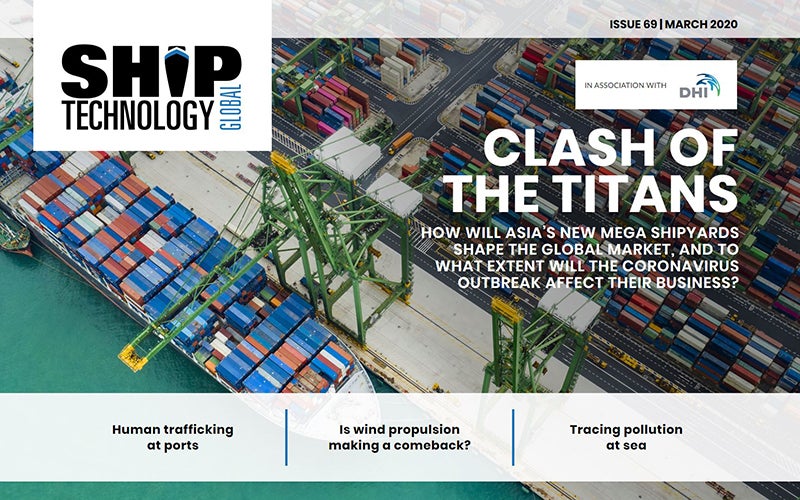
Ship Technology Global is back for another issue packed with technology news and industry analysis. In this issue, we ask how major shipbuilding mergers could affect the industry in the wake of coronavirus, find out whether ports can do more to tackle human trafficking, and analyse a new voyage optimisation software that could highlight the potential of wind propulsion in shipping.
Whether you are on a desktop, tablet or smartphone, you can read the latest issue for free online.
In this issue
How two major shipping canals are mitigating climate change
Upon realising the harmful effects of climate change, canals across the globe are increasingly implementing initiatives to cut greenhouse gas emissions. Varsha Saraogi investigates what the world’s two most famous canals are doing to boost sustainability.
Read this special interactive feature here.
Mega-mergers: how will new shipyard goliaths in Asia shape competition?

US Tariffs are shifting - will you react or anticipate?
Don’t let policy changes catch you off guard. Stay proactive with real-time data and expert analysis.
By GlobalDataThe recent merger between China’s two largest shipbuilders is triggering competition concerns as similar deals are currently on the cards for neighbours South Korea and Japan. How are these Asian mega-mergers stacking against each other, and how could they change the shipbuilding market? Adele Berti finds out.
Human traffic: tackling people-smuggling at ports
The tragic deaths of 39 Vietnamese migrants, discovered in the back of a lorry in Essex, has once again highlighted the misery caused by human trafficking through ports. How can authorities improve port security to tackle people smuggling and prevent more unnecessary deaths? Chris Lo reports.
Nigerian ports: forging a new shipping future in West Africa
Nigeria holds a leading position within the West African maritime sector, for which it acts as a key gateway to Europe. But with its six seaports struggling with capacity constraints and poor infrastructure, how is it working to enhance this position? Adele Berti finds out.
Will wind-assisted propulsion blow the maritime industry away?
A partnership between NAPA and C-Job Naval Architects is studying the applications of wind-assisted propulsion using voyage optimisation software, hoping to ultimately drive the industry away from polluting fuels and help it prepare for the IMO’s ever-stricter requirements. Adele Berti finds out more.
RAMSSES: a new era of lightweight materials in shipbuilding
While advanced composites are common in aviation and car building, most ships are still made of heavy steel, something the EU-funded project RAMSSES is keen to change. The project is collaborating with industrial and research partners on hulls, superstructures, decks and cabins, as well as rudders and propellers. Frances Marcellin finds out more from CMT research and development engineer Matthias Krause.
Cyber-SHIP lab: a timely intervention as cybersecurity washes the blue economy
The shipping industry might be the lifeblood of trade and commerce, but it remains wanting when it comes to cybersecurity awareness. This makes the launch of Cyber-SHIP Lab, a new research and training facility at the University of Plymouth, especially opportune. Ross Davies met with the project’s principal investigator, professor Kevin Jones, to find out more.
Tracking and tracing polluting ships
The ongoing case of a ship’s oil discharge off the coast of Brazil has sparked fresh concerns over the need to improve surveillance of ships around the world. Authorities in the EU and the Mediterranean Sea share their expertise on the issue and explain what measures are currently in place in their respective areas to reduce ship pollution cases in the future. Adele Berti reports.
Next issue preview
In the next issue, we trace the timeline of the coronavirus outbreak as it happened, and ask how global shipping has been impacted.
We also explore the financial cost of creating a more environmentally friendly shipping industry, ask whether age discrimination still exists in seafarer recruitment, and explore the causes and technological solutions to battery fires on ships.
Speaking of technology, we examine ICEYE’s Dark Vessel Detection solution designed to help countries monitor shipping activity on their coasts, and find out how photonic marine applications could assist with everything from underwater range-finding to navigation.
Finally, we explore the darker side of shipping with an in-depth look at wildlife trafficking countermeasures being deployed in Tanzania, and map out piracy hotspots worldwide.
Would you like to be notified when a new issue of Ship Technology Global is out? Sign up for email alerts here!
We will only use your email address to let you know when a new issue is available. Ship Technology Global is published bimonthly.



